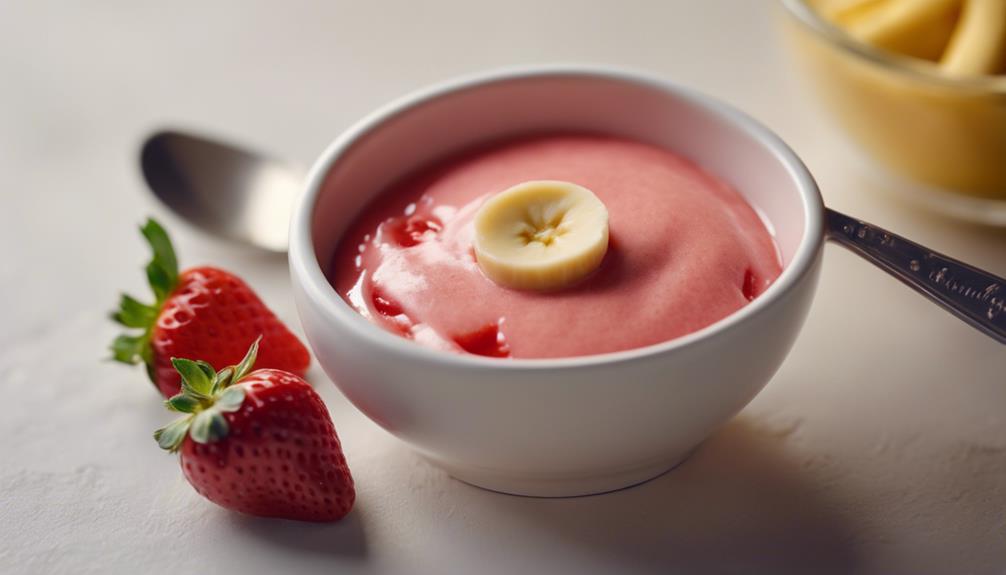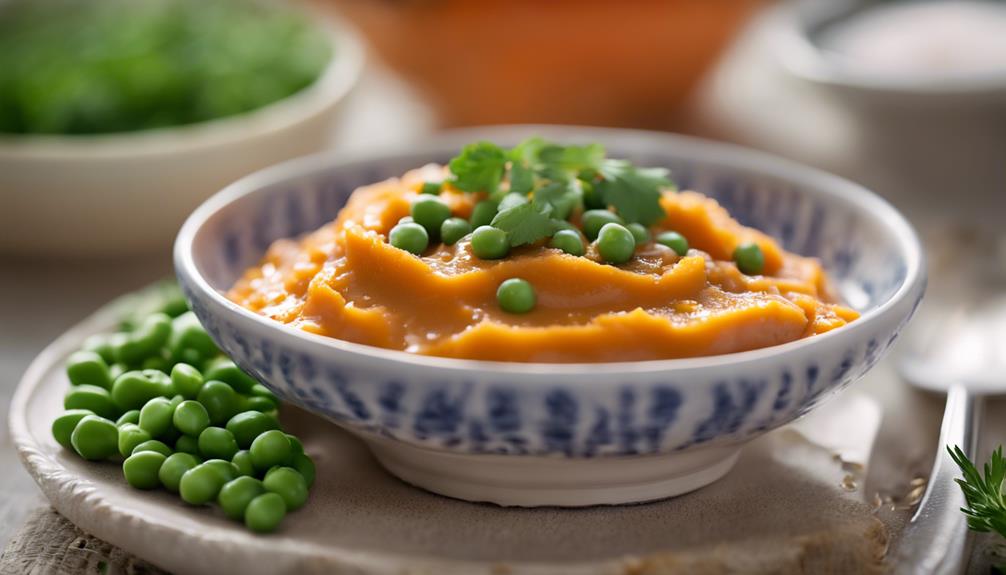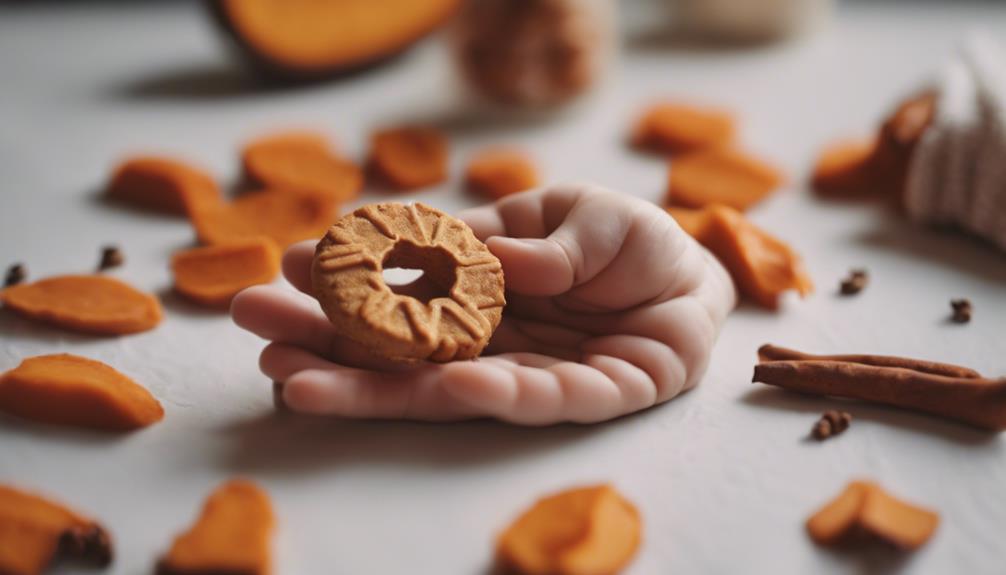To make a nutrient-rich carrot puree for your baby, start by peeling and chopping fresh carrots. Cook them until soft, then blend into a smooth consistency. Adjust texture with breast milk or water. Store leftovers in the fridge for up to 3 days or freeze for 3 months. Enhance flavor by experimenting with spices or combining with other vegetables or fruits. Proper storage in BPA-free containers ensures freshness. Homemade carrot puree introduces essential nutrients like beta-carotene, vitamin C, and fiber to support your baby's health. For more tips and variations on this simple and healthy recipe, continue exploring the benefits and instructions provided.
Key Takeaways
- Freshly peel, chop, and cook carrots for a smooth puree.
- Blend with breast milk or water for desired consistency.
- Store leftovers in suitable containers in the fridge or freezer.
- Experiment with flavors and pairings for variety.
- Opt for organic carrots for nutrient retention and less pesticide exposure.
Homemade Carrot Baby Food Benefits
Discover the numerous benefits of homemade carrot baby food for your little one's health and development. Making your own baby food using carrots offers a fresh, nutrient-rich option that surpasses many shelf-stable alternatives.
By preparing baby food at home, you have control over the ingredients, ensuring a healthier choice for your child. Introducing carrots early on provides essential nutrients essential for your baby's growth, including beta-carotene, vitamin C, iron, calcium, and fiber.
Carrots aren't only easy to digest but also aid in maintaining regular bowel movements in babies, making them an ideal first food for your little one. The act of preparing homemade carrot baby food can be a rewarding experience for parents and caregivers, offering a sense of satisfaction and peace of mind knowing exactly what goes into your baby's meals.
Give your baby the best start by incorporating homemade carrot baby food into their diet.
Carrot Nutrition for Infants

Carrots offer a wealth of nutrients essential for your infant's growth and development. Beta-carotene in carrots supports eye health and immunity, while vitamin C, iron, calcium, and fiber provide a well-rounded nutritional profile.
Introducing carrots early can aid in digestion, regular bowel movements, and overall health for your little one.
Nutrient-Rich Carrot Benefits
Rich in important nutrients like beta-carotene, vitamin C, iron, calcium, and fiber, carrots offer valuable benefits for your infant's growth and overall health.
Beta-carotene in carrots is particularly vital as it converts to vitamin A, promoting healthy growth and development in infants. Additionally, the presence of vitamin C in carrots supports the immune system, while iron and calcium aid in overall health and development.
The fiber content in carrots not only helps with digestion but also promotes normal bowel movements in babies. Furthermore, the beta-carotene found in carrots contributes to maintaining good eye health in infants.
Introducing carrots early in your baby's diet can provide them with a nutrient-rich source of essential vitamins and minerals necessary for best growth and development. By incorporating carrot puree into your infant's meals, you're giving them access to a wide array of health benefits that support their well-being from an early age.
Essential Infant Nutrients
Beta-carotene, along with other necessary nutrients found in carrots, plays a central role in supporting your infant's growth and development.
When preparing homemade carrot puree for your baby, you're providing them with a powerhouse of nutrients essential for their overall health.
Carrots are rich in beta-carotene, which is fundamental for healthy eyesight and a robust immune system in infants. Additionally, these vibrant orange vegetables contain important vitamins such as vitamin C, minerals like iron and calcium, and fiber, all significant components of a well-rounded diet for your little one.
Introducing carrots early on can help establish healthy eating habits and guarantee that your baby receives the necessary nutrients for best growth.
When considering baby food combinations, including carrot puree can be a nutritious choice that's easy to digest and can aid in promoting regular bowel movements.
Check out the table below for a quick overview of the essential nutrients found in carrots for infants.
Making Carrot Puree

To make carrot puree for your baby, start by peeling and chopping the carrots before cooking them through methods like steaming, boiling, or roasting.
Once the carrots are cooked, blend them until smooth to achieve the desired puree consistency.
Adjust the thickness of the puree by incorporating breast milk, formula, or water to suit your baby's preferences and then store any leftovers in the fridge for up to 3 days or freeze for convenient future use.
Recipe Preparation Methods
When making carrot puree for your baby, start by peeling and chopping the carrots before cooking them to a soft consistency.
Homemade carrot puree can be prepared by steaming, boiling, or roasting the carrots until they're tender.
Once the carrots are cooked, blend them into a smooth puree by adding breast milk, formula, or water to adjust the texture according to your baby's preference.
For storage, refrigerate the homemade carrot puree for up to three days or freeze it for a longer shelf life of up to three months.
Consider using silicone trays for freezing if feeding younger babies, while glass containers are more suitable for older infants.
Ensuring the puree is properly stored and prepared will help in providing a nutritious and wholesome meal for your little one.
Nutritional Benefits
Consider the nutritional benefits of making carrot puree for your baby to provide essential nutrients and support their overall health and development.
Carrots are a powerhouse of nutrients, including beta-carotene, Vitamin A, Vitamin C, iron, calcium, and fiber, all critical for infants' growth.
Beta-carotene in carrots plays a crucial role in supporting eye health and boosting the immune system in babies.
Furthermore, the easy digestibility of carrots makes them an ideal choice for young ones, promoting regular bowel movements.
Opting for homemade baby food like carrot puree guarantees a fresh and nutrient-rich alternative to store-bought options, offering a higher level of control over ingredients and quality.
Introducing carrots early in your baby's diet not only exposes them to a variety of nutrients but also helps in developing a preference for vegetables, laying a foundation for healthy eating habits in the future.
Homemade carrot puree is a simple yet effective way to provide your little one with a nutrient powerhouse for their overall well-being.
Storing Carrot Baby Food

Store your carrot puree in containers free of BPA or silicone ice cube trays for top freshness. Glass containers are also suggested for older babies. Labeling these containers with the preparation date helps track freshness and expiration, ensuring your baby consumes the food within its prime period. Carrot baby food can be stored in the refrigerator for up to 3 days or in the freezer for up to 3 months. Proper storage in airtight containers maintains freshness and makes feeding your baby convenient.
| Container Type | Recommended Age Group | Storage Duration | Additional Tips |
|---|---|---|---|
| BPA-Free Containers | All Ages | Fridge: 3 days | Label with date for tracking freshness |
| Silicone Ice Cubes | All Ages | Freezer: 3 months | Easy to portion out for feeding |
| Glass Containers | Older Babies | Fridge: 3 days | Ideal for storage due to non-reactive material |
Additional Information and Tips

When making carrot puree for your baby, consider selecting organic carrots for best nutrition.
Enhance the flavors by experimenting with spices like ginger or garlic.
Proper storage in BPA-free containers or ice cube trays is essential to maintain freshness and convenience.
Ingredient Selection Tips
For best nutrition and safety when preparing carrot puree for your baby, prioritize selecting organic carrots to reduce pesticide exposure. Organic carrots are grown without synthetic chemicals, making them a healthier choice for your little one.
When choosing carrots for baby food, opt for high-quality organic produce to guarantee your baby receives the best nutrition.
Peeling carrots before cooking is essential as it not only removes any dirt or bacteria on the skin but also enhances the texture of the puree. Assure the safety and cleanliness of your ingredients and tools to prevent any contamination during the preparation process.
Feedback and comments on recipes can also provide helpful variations and tips for ingredient selection. These insights can help you make informed decisions when choosing the best ingredients for your baby's carrot puree.
Flavor Variation Ideas
To infuse your baby's carrot puree with delightful flavors, consider incorporating various spices, herbs, and complementary ingredients.
- Experiment with spices like ginger, curry seasoning, or garlic to add depth and complexity to the puree.
- Try incorporating different herbs such as rosemary or thyme for a fresh and fragrant twist on the classic carrot flavor.
- Combine the carrot puree with other vegetables or fruits like sweet potatoes or apples to introduce new tastes and textures to your baby's meals.
- Boost the nutritional value of the puree by adding healthy fats such as olive oil or coconut oil, providing essential nutrients and a smoother texture.
- Create balanced meals for your baby by pairing the carrot puree with velvety foods like yogurt, whole grains such as quinoa, or leafy vegetables like spinach to guarantee a diverse and nutritious diet.
Storage Recommendations
Consider transferring your freshly prepared carrot mash into BPA-free containers or ice cube trays for convenient storage. For younger babies, silicone trays can be a great choice due to their flexibility, while older babies may benefit from glass containers.
Remember to label the containers with the preparation date to track freshness and expiration. When it comes to storage, you can keep the carrot mash in the fridge for up to 3 days or in the freezer for up to 3 months.
By following these storage recommendations, you ensure that the mash stays fresh and easily accessible whenever you need it. Proper storage not only maintains the quality of the carrot mash but also provides you with the convenience of having homemade baby food readily available.
Recipe Ingredients and Instructions
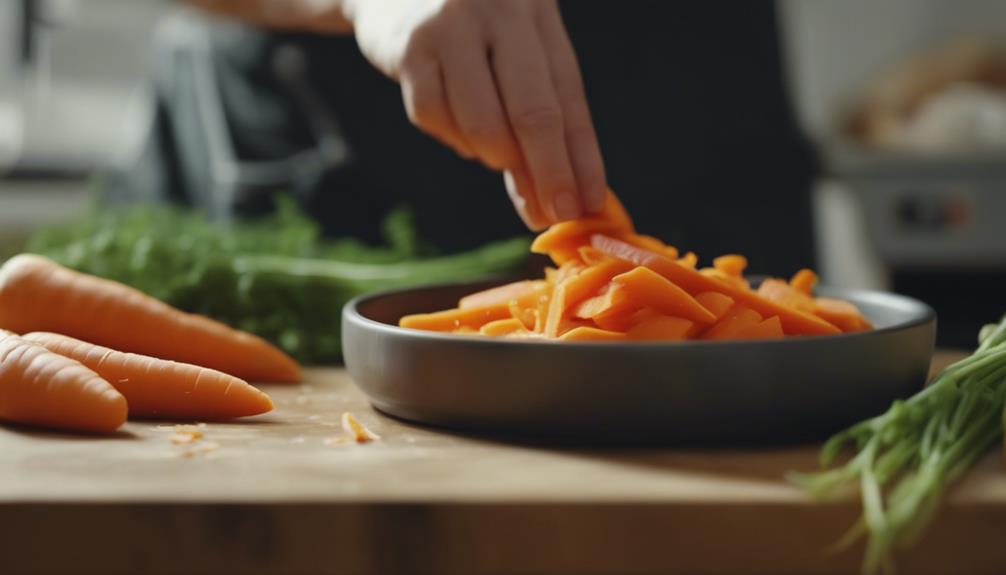
Peel and chop fresh carrots before cooking for the puree to guarantee a smooth texture for your baby's meal.
When you're ready to make Carrot Puree, follow these simple recipe ingredients and instructions:
- Ingredients:
- Fresh carrots
- Breast milk, formula, or water for adjusting consistency
- Instructions:
- Start by peeling and chopping fresh carrots.
- Choose your preferred cooking method: steaming, boiling, or roasting until soft.
- Once the carrots are cooked, blend them until smooth.
- Adjust the puree's consistency by adding breast milk, formula, or water as needed.
- Store any leftovers in the fridge for up to 3 days or freeze for up to 3 months for convenience.
Following these steps will guarantee you have a nutritious and delicious carrot puree ready for your little one.
Health Benefits and Nutritional Information

Carrots offer a plethora of essential nutrients and health benefits for your baby's growth and development. Including homemade carrot puree in your baby's diet can provide them with vital nutrients like beta-carotene, antioxidants, fiber, vitamin K, and calcium. These nutrients play a crucial role in promoting overall health and development in infants. Beta-carotene, specifically found in carrots, supports eye health, immune function, and normal bowel movements in babies. Opting for organic carrots in homemade baby food is recommended as they have reduced pesticide exposure and retain optimal nutrient content. Homemade carrot puree is easy to digest and is a rich source of essential vitamins like A and C, iron, and fiber necessary for the growth of your little one. Introducing carrots early in your baby's diet can help establish healthy eating habits and expose them to a variety of flavors and textures.
| Nutrient | Health Benefits | Recommended Intake |
|---|---|---|
| Beta-carotene | Supports eye health and immune function | Daily intake of 400-600mcg |
| Antioxidants | Protects cells from damage | Include in daily diet |
| Fiber | Aids digestion and bowel regularity | Age-based recommendations |
| Vitamin K | Essential for blood clotting | Daily intake varies |
| Calcium | Important for bone health | Daily intake varies |
Storage and Preservation
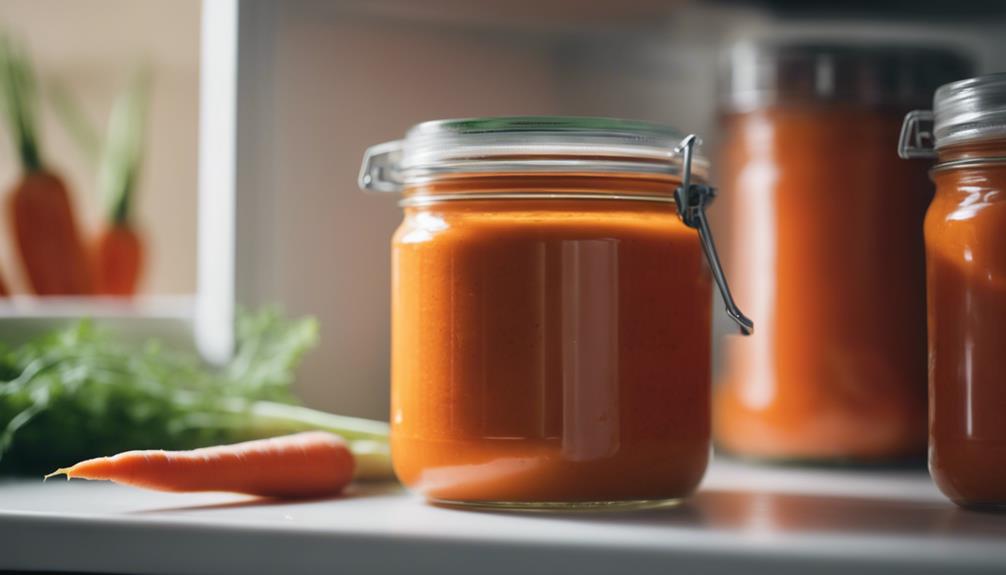
To guarantee the longevity and quality of your homemade carrot puree, proper storage methods are crucial. Here are some essential tips:
- Transfer the carrot puree into airtight BPA-free containers or ice cube trays for best storage.
- Silicone trays are recommended for younger babies, while glass containers work well for older babies.
- Label the containers with the preparation date to easily track freshness and storage duration.
- Store the carrot baby food in the fridge for up to 3 days to maintain freshness.
- Alternatively, the puree can be frozen for up to 3 months to extend its shelf life and ensure convenient access for quick and easy feeding.
Proper storage not only preserves the freshness of the puree but also makes feeding your baby a hassle-free experience.
Tools and Equipment Needed

For this recipe, you'll need essential tools such as a blender or food processor to puree the carrots. These appliances will help you achieve a smooth and creamy texture for your baby's carrot puree.
Additionally, a saucepan with a steamer basket is required for steaming the carrots before pureeing. The steaming process helps retain the carrots' nutrients and natural flavors.
In preparation for cooking, knives are necessary for trimming and chopping the carrots to a suitable size for steaming. A vegetable peeler will also come in handy for peeling the carrots before cooking, ensuring a clean and safe cooking process.
Lastly, storage containers are essential for storing the carrot puree in the fridge or freezer. Make sure to choose containers that are freezer-safe and easy to stack for convenient storage. Proper storage will help maintain the freshness and quality of the carrot puree for your baby's meals.
User Comments and Feedback

Let's now shift our focus to the thoughts and experiences shared by users in the comments section regarding making homemade baby food.
- Thinkbaby finds homemade baby food easy to make and convenient for their baby.
- Carol inquires about the safety of adding olive oil to baby carrots for additional flavor.
- Christina suggests roasting carrots as a method to enhance the taste of the puree.
- Meg B. expresses excitement to begin making homemade baby food for her little one.
- Kristen M. shares a positive experience with the roasted carrot baby food, highlighting its taste and health benefits.
These comments reflect a variety of perspectives on the homemade baby food recipe. From the ease and convenience praised by Thinkbaby to the flavor-enhancing suggestion of roasting carrots by Christina, users are actively engaging with the process of creating nutritious meals for their little ones.
Carol's query about the use of olive oil demonstrates a concern for both taste and safety, while Kristen M.'s positive experience underscores the delicious and healthful qualities of the roasted carrot puree.
Frequently Asked Questions
Is Homemade Carrot Puree Safe for Babies?
Homemade carrot puree is safe for your baby when prepared with proper hygiene practices. Wash, peel, and cook carrots thoroughly before blending. Enjoy control over ingredients, avoiding additives and excess salt found in store-bought options.
Can Babies Eat Carrot Puree Everyday?
Babies can enjoy carrot puree daily as part of a balanced diet. It's nutritious, rich in essentials like beta-carotene and fiber. However, remember to watch for any allergies or digestive issues. Consult with your pediatrician for personalized advice on feeding.
How to Make Carrot Puree for Baby Without Blender?
When making carrot puree for your baby without a blender, soften carrots until very tender, then mash with a fork or potato masher for a smooth consistency. Experiment with methods for the perfect texture.
Can I Give My Baby Carrots Everyday?
You can give your baby carrots every day as they are nutritious and safe. Carrots provide essential nutrients for growth and development, support eye health, and help with bowel movements. Guarantee a balanced diet with varied foods.
Conclusion
To sum up, homemade carrot puree offers a wealth of benefits for your baby's health and development.
Did you know that just one cup of cooked carrots provides over 400% of the daily recommended intake of Vitamin A for infants?
By incorporating this straightforward and nourishing recipe into your baby's diet, you can help them receive vital nutrients while introducing them to a range of flavors.
Start making your own carrot puree today and give your little one a healthy head start!

